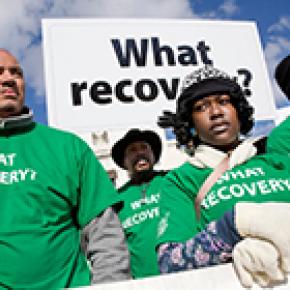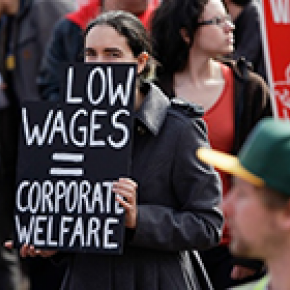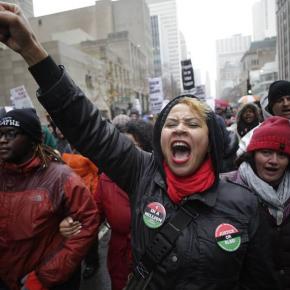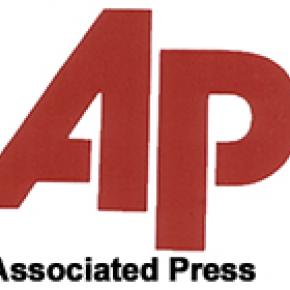Fed Up Says It Unjustly Lost Rooms at Jackson Hole Meeting
A coalition of community and labor groups known as “Fed Up” said 39 members planning to stay at the hotel hosting the...
A coalition of community and labor groups known as “Fed Up” said 39 members planning to stay at the hotel hosting the Federal Reserve’s prestigious annual retreat in Jackson Hole, Wyoming, were unfairly singled out when their 13 room reservations were canceled.
The group, which is pressing the U.S. central bank to appoint more minorities and women to its leadership, said most of its attendees would have been black and Latino. It has filed a complaint with the U.S. Department of Justice and other government officials. The group believes it lost the rooms because of “specific targeting of the Fed Up coalition.”
Fed Chair Janet Yellen is the first woman to lead the U.S. central bank and it remains under pressure to become more diverse. Democratic presidential nominee Hillary Clinton joined calls for reform in May and the central bank has taken fire from Republicans, who warn its low interest rate policies risk inflating another asset bubble.
The Fed Up coalition, which wants rates to stay low to boost hiring and lift wages, has discussed its concerns with Fed officials, including Esther George, president of the Kansas City Fed, which hosts the annual Jackson Hole monetary-policy conference in late August.
Faced with criticism that it doesn’t look out for the interests of poorer Americans, the Fed has been making efforts to change. The Kansas City Fed said on Thursday that it will hold a conference on the challenges low- to moderate-income communities face on Sept. 7-8 at its headquarters.
Booking Error
Alex Klein, vice president and general manager of Grand Teton Lodge Company and Flagg Ranch, said the reservations were canceled because “an error in the booking system” resulted in the Jackson Lake Lodge being oversold by 18 rooms. “We worked proactively and diligently with guests to relocate them to our nearby Flagg Ranch property,” he said in a statement.
The Kansas City Fed has a contract to provide rooms for guests at the symposium and “has no input regarding any decisions that the Lodge makes outside of its contract with us,” said bank spokesman Bill Medley.
The symposium, which gathers policy makers and economic-thought leaders for a three-day retreat in the heart of the Grand Teton mountains, is probably the most important event of its kind on the central-banking calendar. Yellen will attend and plans to address the conference on Aug. 26. This year’s meeting, which is invitation only, is focused on the topic “Designing Resilient Monetary Policy Frameworks for the Future.”
The hotel, while remote, is open to the public and Fed Up representatives have made the trip for the past two years. In 2015, Fed Up held an alternative conference at the Lodge which was addressed by Nobel-prize winning economist Joseph Stiglitz.
By Steve Matthews & Jeanna Smialek
Source
New York dedicates millions of dollars to help immigrants fight deportations

New York dedicates millions of dollars to help immigrants fight deportations
New York will soon offer free legal services for poor immigrants facing deportations, thanks to a new budget provision...
New York will soon offer free legal services for poor immigrants facing deportations, thanks to a new budget provision announced this week by Gov. Andrew Cuomo.
The state’s 2017-2018 budget sets aside $10 million for expanding immigrant legal defense services, $4 million of which will go to the Vera Institute of Justice’s New York Immigrant Family Unity Project — a coalition of groups that seek to ensure that all undocumented immigrants have public defenders...
Read full article here.
2020 Democrats Band Together To Call For Puerto Rico Debt Cancellation

2020 Democrats Band Together To Call For Puerto Rico Debt Cancellation
Ana Maria Archila, co-executive director of the Center for Popular Democracy, welcomed the legislation. “The vast...
Ana Maria Archila, co-executive director of the Center for Popular Democracy, welcomed the legislation. “The vast majority of Puerto Rican debt is owned by actors who invested knowing full well that Puerto Rico could not pay,” she said. “There’s no way for Puerto Rico to recover if it has to use public money to pay hedge funds.”
Read the full article here.
After the Las Vegas Shooting, Taking on Myths About Gun Control

After the Las Vegas Shooting, Taking on Myths About Gun Control
Nearly 60 people were killed and more than 500 injured in the worst mass shooting in modern US history on Sunday night...
Nearly 60 people were killed and more than 500 injured in the worst mass shooting in modern US history on Sunday night, early Monday morning in Las Vegas at a concert. As details are still emerging about the suspected shooter, we’ll take on the issue of gun control and the myths of the gun industry with Dennis Henigan. Then, we’ll turn to the situation in Puerto Rico. Samy Olivares of the Center for Popular Democracy will give us a report on the on-going slow-motion disaster unfolding in the aftermath of Hurricane Maria and how mainland Americans can help. Finally, author George Monbiot joins us from London to discuss his new book Out of the Wreckage: A New Politics for an Age of Crisis. Hosted by Sonali Kolhatkar.
Listen to the story here.
U.S Workers say the economy needs more support
BetaWired - November 15, 2014 - Jean Andre an American activist decided to visit the Federal Reserve Board’s...
BetaWired - November 15, 2014 - Jean Andre an American activist decided to visit the Federal Reserve Board’s headquarters on Friday to express his concerns about getting a decent job. Janet L. Yellen, the Fed’s chairwoman, agreed to meet him together with about 30 workers concerning the plight of Americans searching for work and struggling to make a living.
Accompanied by Fed’s board of governors officials; Stanley Fischer, the vice chairman; Lael Brainard; and Jerome H. Powell, the jobless Americans had a chance to express their views for about an hour.
Ady Barkan, a lawyer with the Center for Popular Democracy, an advocacy group based in New York that orchestrated the meeting said “The Federal Reserve is too important of an institution to be insulated from the voices and perspectives of working families, we think that the Fed needs to listen more and be more responsive, and we’re very grateful for this first opportunity.”
The Fed declined to comment, citing a policy of silence about private meetings but the workers described what they said in the meeting that was closed to the media. Ady Barkan’s group is campaigning for the Fed to carry on with its stimulus program, citing the high level of unemployment, particularly in minority communities, and the slow pace of wage growth. The group further argued that the Fed could help drive wages up by keeping interest rates low.
According to Josh Bivens, an economist at the Economic Policy Institute, a liberal research group, “monetary policy would be “the single most important determinant of wage growth” and that he was glad to see workers recognize the Fed’s importance. A conservative group, American Principles in Action, criticized the meeting as “highly political” and inappropriate expressing that it would seek a related meeting to share its view that the Fed’s stimulus campaign is damaging the economy.
The labor and community groups at the meeting wore green T-shirts that said “What Recovery?” on the front, with a chart demonstrating meager wage gains on the back. They also compelled Yellen to change the way the Fed chooses the presidents of its regional banks.
On Thursday, The Federal Reserve Bank of Dallas stated that its president, Richard W. Fisher, would step down on March 19 2015. Furthermore, Charles I. Plosser, president of the Federal Reserve Bank of Philadelphia, plans to retire at the beginning of March.
Source
The Fed Just Inched Closer To Raising Interest Rates
The Federal Reserve announced on Wednesday that it will keep interest rates at or near zero for now, but implied it...
The Federal Reserve announced on Wednesday that it will keep interest rates at or near zero for now, but implied it would soon raise them, alarming left-leaning activists and economists concerned about stagnant wages.
The Federal Open Market Committee (FOMC), which is the central bank’s body responsible for managing key interest rates, said in a statement that its decision was based on the conclusion that interest rates of zero to 0.25 percent -- known as the “zero lower bound” -- were still needed to “support continued progress toward maximum employment and price stability.” The statement refers to the Fed’s dual mandate to both pursue full employment and keep inflation low through its control of the money supply.
The FOMC said that inflation in particular continues to remain too low to warrant an interest rate hike.
“Inflation continued to run below the Committee's longer-run objective, partly reflecting earlier declines in energy prices and decreasing prices of non-energy imports,” the committee said in the statement.
However, the Fed also indicated in its statement that it is optimistic about the pace of economic growth, buoying expectations of a rate hike in September when the FOMC meets next. Many analysts have been predicting that the Fed would raise rates as soon as September, or at least before the year’s end.
The FOMC statement noted that “economic activity has been expanding moderately in recent months. The labor market continued to improve, with solid job gains and declining unemployment.”
The Fed has kept the primary interest rate it controls near zero since December 2008.
Many activists and economists, including the left-leaning nonprofit Center for Popular Democracy’s Fed Up campaign, believe that the Fed has prioritized the inflation half of its dual mandate at the expense of full employment. They argue against raising rates before unemployment gets low enough for employers to raise wages. And they are especially considered that unemployment rates remain disproportionately high in communities of color.
The Fed Up campaign was pleased that the Fed did not raise rates on Wednesday, but called the lack of a rate hike a “low bar,” since it was not even expected by most observers. Instead, the campaign emphasized its frustration with the FOMC statement for ignoring signs of slack in the job market.
“The FOMC statement hails ‘solid job gains,’ but does not mention that the most recent job figures showed a slowdown in wages,” said Jordan Haedtler, deputy campaign manager for Fed Up. “The downward trend in wages is a major reason why the Fed should not raise interest rates in 2015.”
Source: Huffington Post
The United Cities of America: What Seattle's Minimum-Wage Deal Means
The Atlantic - May 2, 2014, by Eric Liu - On Wednesday, a Senate...
The Atlantic - May 2, 2014, by Eric Liu - On Wednesday, a Senate filibuster blocked President Obama’s proposal to raise the federal minimum wage to $10.10. Then on Thursday, Mayor Ed Murray of Seattle announced a business-labor deal to raise the city minimum wage to $15.
Procedurally, these two things had nothing to do with each other. Substantively, Seattle’s action is a direct result of the Senate’s inaction—and it portends the acceleration of two trends in public policy today: a growing willingness to reckon with radical inequality and wage stagnation, and the emergence of networked localism as a strategy for political action.
Let’s first unpack what happened in Seattle. The mayor appointed a committee of citizens to develop a proposal for $15. I was a member of that task force, which included union leaders and businesspeople and nonprofit heads and chamber-of-commerce chiefs. We gathered data. We commissioned studies. We held a big public symposium. Negotiations were complex and often heated and the committee missed its deadline, but we eventually got a deal that won the support of 21 of 24 members.
The grassroots “$15 Now” activists who helped propel a socialist to the city council and helped put this issue on the map last year are unsatisfied with the number of years and the accommodations. They aim to go to the ballot directly with a plan that’s closer to, well, $15 now. And the city council still must vote to enact this or any plan, and may come under pressure to amend it many ways.
The deal is nobody’s picture of perfect. It’s a compromise. It phases in minimum-wage hikes so that an employer has to get to $15 in three years (for businesses with more than 500 employees), four years (same, but offering healthcare), or seven years (for businesses with fewer than 500). The under-500 businesses also get several years to count a portion of worker tips and healthcare toward the wage requirements.
But pull back from the substantive details and the process hoops ahead. This is, as the vice president might say, a big f-ing deal. It’s not just the $15 figure, which sets the floor higher than in any other city or state. It’s the fact that a broad coalition with significant business support made it happen.
That makes this deal a model for other cities—and further evidence that norms are changing. It suggests that it’s becoming less acceptable in America to run a business in a way that relies on poverty wages. It’s becoming less acceptable to suggest that the go-to remedy for the pain of working people should be tax cuts for the wealthy. And though a minimum-wage increase is not an innovative tool, its revival is part of a widening repertoire of policy ideas for closing the opportunity gap.
We brought in leaders and experts from Chicago, Philadelphia, San Francisco, New York—all cities that have raised the wage or taken steps to.
Perhaps more significantly, Seattle’s action shows we’re entering a new age of bypass. Washington is stuck and will be for the foreseeable future. So it falls increasingly to cities to act—and in increasingly coordinated ways. As the Seattle task force explored possible pathways to $15, we brought in elected leaders and experts from San Jose, Chicago, Philadelphia, San Francisco, New York, all cities that have raised the wage or taken steps to. We all shared tactics, policy proposals, lessons, and language.
Groups like Local Progress have emerged to link up politicians and policy entrepreneurs from disparate cities, not just on wages but also on criminal-justice reform, immigrant rights, voting rights, climate change, and other issues. The cities of the United States are beginning to web up into an archipelago of policy experimentation and problem-solving.
This networked localism is distinct from the mere downward distribution of national political dollars to local campaigns. It’s also distinct from the Koch brothers’ strategy of creating wholly owned political subsidiaries in small towns to push agendas. And it’s not just about having mayors who are skillful, important as that is. Networked localism is a form of citizenship from the middle out and the bottom up, where residents decide to act together and to learn in real time from their counterparts in other places.
Thus far, perhaps owing to the progressive tilt of big cities, networked localism seems to be practiced mainly by progressives. That may place a political limit on its ultimate reach. Another limit, of course, is structural: On most issues, even well-woven webs of cities cannot do what a well-run national government can. A $15 wage will directly benefit tens of thousands of low-income workers in my city. It does nothing for millions of others in my country.
Nevertheless, it’s safe to say that Seattle’s $15 moment is a sign of a shift in self-government. The last century rewarded political leaders like TR or LBJ who knew how to centralize the local into the national. This century may belong to those who can decentralize the national—but into a new kind of national. Call it the United Cities of America.
Source
Protesting health care repeal
Senate Republicans tried and failed three times to repeal the Affordable Care Act. Many Americans who were against the...
Senate Republicans tried and failed three times to repeal the Affordable Care Act. Many Americans who were against the repeal spent time calling and writing to their senators, and even making it to Washington to protest the plans in person. Those advocates say they believe standing up against the repeal efforts made all the difference. Karen Scharff from Citizen Action, Michael Kink from Strong Economy for All, and Jaron Benjamin from Housing Works discuss their fight against the repeal.
Watch the video here.
This Is What Chicago Can Learn From America's Other Police Accountability Taskforces
This Is What Chicago Can Learn From America's Other Police Accountability Taskforces
Chicago Mayor Rahm Emanuel ...
Chicago Mayor Rahm Emanuel announced the formation of a police accountability task force Tuesday.
In a Monday press release, the mayor said the five-member body — which he will appoint, and which will be advised by former Massachusetts governor Deval Patrick — "will review the system of accountability, oversight and training that is currently in place for Chicago's police officers," according to the Chicago Tribune.
"The shooting of Laquan McDonald requires more than just words," Emanuel said in a statement. "It requires that we act."
The announcement came one week after a Cook County judge compelled the city to release video footage of the Oct. 2014 killing of 17-year-old Laquan McDonald, which was captured on a patrol car dash camera but kept under wraps for 13 months.
McDonald's killer, Officer Jason Van Dyke, shot the teenager 16 times in front of multiple witnesses but was charged with first-degree murder only last week. The sluggish circumstances of the release have since drawn accusations of an administrative cover-up. Van Dyke was released from jail Monday after posting ten percent of his $150,000 bail.
Mayor Emanuel also fired Chicago Police Superintendent Garry McCarthy on Tuesday, in response to calls from the public and some officials to have him removed. Meanwhile, the video's release has set off a week of protests in Chicago, as questions remain regarding next steps.
Jason Van Dyke is the first Chicago police officer to be charged with first-degree murder for an on-duty incident in 35 years, a fact that has elicited doubt Emanuel's task force will yield substantive results.
"Our first thought is that this [task force] can't be a substitute for what's really needed here, which is a full-scale federal investigation of the Chicago Police Department with subpoena power," Ed Yohnka, Director of Communications and Public Policy at the ACLU of Illinois, told Mic. "Whatever this task force does, what we've witnessed in this and other instances is a fundamental breakdown in the ability of police to protect the public, and the public's faith in CPD."
Others echoed Yohnka's skepticism. "Appointing a committee to look into an issue is a tried-and-true tactic elected officials long have employed to buy time and breathing room when faced with a scandal or crisis," wrotethe Chicago Tribune. "[It] gives Emanuel something else to talk to reporters and the public about other than the ... video."
Indeed, it's unclear how effective police accountability task forces in other cities have been. An Inspectors General was appointed in Los Angeles, New York City and New Orleans have uncovered systemic abuses and identified problems that shoddy or nonexistent data collection had rendered invisible over the past decade. Seattle has a 15-member community police commission, appointed by the mayor, to review oversight and accountability processes.
However, "there is no clear evidence that these oversight bodies alone are effective in obtaining meaningful reforms," according to a Justice in Policing report and toolkit from the Center for Popular Democracy and PolicyLink, both policy advocacy organizations.
Yohnka suggested to Mic that a more tried route to change in Chicago would require a U.S. Department of Justice investigation. "That confidence needs to be restored, that someone in power is actively looking into this," he said. "But it's systemic. This issue pervades multiple superintendents and multiple people in terms of leadership in the department. It requires a systemic approach to accountability, transparency and how law enforcement operates."
One such DOJ examination of the Ferguson, Missouri, Police Department published in March laid bare a hotbed of racist law enforcement practices that yielded reform suggestions amidst a national conversation around racism and policing. This is not a unique phenomenon. According to the Washington Post, the DOJ has launched 67 investigations into police departments across the U.S. over the past decade, 24 of which were closed without reform agreements, and just 26 of which resulted in "binding agreements tracked by monitors."
Results have been mixed. The long-term effect of these agreements are not tracked by the DOJ, making it hard to tell if they actually work.
"We don't tend to evaluate .?.?. after we have left," Vanita Gupta, principal deputy assistant attorney general of the department's civil rights division, told the Post. "There's a limit to how much we can .?.?. remain engaged with a particular jurisdiction given our limited resources."
This leaves little precedent for a positive outcome in Chicago — a city with a staggering recent history of police abuse. Over the past decade, the city has spent $500 million on legal costs and settlements stemming from law enforcement misconduct, including $5 million paid out to Laquan McDonald's family in April.
That same month, Chicago set up a $5.5 million fund to compensate victims of former-CPD Commander John Burge, who tortured and sexually abused more than 100 mostly black arrestees during his tenure with the department. The case of Dante Servin, an off-duty officer who fired into a crowd and killed 22-year-old Rekia Boyd in 2012, was also dismissed in April because state's attorney Anita Alvarez — whose office has a history of questionable conduct — charged him with a crime the judge deemed too severe for what he did.
The McDonald case has also been plagued by scandal, including allegations that police officers tampered with surveillance tape that captured the shooting from a nearby Burger King, resulting in 86 minutes of footage gone missing.
Some have suggested the mere appearance of police accountability can have positive effects, lending legitimacy to law enforcement bodies that had formerly lost the trust of their communities. But in the case of Chicago, it may be too late for that.
"The reality is, we're kind of past the point of cosmetics here," said Ed Yohnka. "There's been this fundamental breakdown in terms of trust. Whether we're talking the Burge incidents or the millions of dollars in payouts to victims, there really needs to be a much broader look at what is going on."
Source: Mic
Jackson Hole Demonstrators Rally Against Rate Hike
Associated Press - August 22, 2014, by Matthew Brown — Shadowing central bankers and economists at the annual Federal...
Associated Press - August 22, 2014, by Matthew Brown — Shadowing central bankers and economists at the annual Federal Reserve conference here, a group of about 10 demonstrators pressed Fed Chair Janet Yellen not to yield to pressure to raise interest rates.
Carrying placards and green T-shirts embossed with the slogan "What recovery?" they said they'd come from New York, Missouri, Minnesota and elsewhere to draw attention to people left behind by the recovery and still unable to find work.
One demonstrator approached Yellen to press his point as she prepared to enter the opening reception Thursday night. With security guards hovering nearby, the two shook hands and spoke for about a minute before Yellen entered the closed-door gathering.
Yellen spokesman Doug Tillett said her staff would seek to arrange a meeting between the chair and the demonstrators back in Washington.
Their message was generally in sync with Yellen's stance since she became Fed chair in February to keep rates low to help support a still-subpar economy. In a speech to the conference Friday, Yellen noted that while the unemployment rate has steadily dropped, other gauges of the U.S. job market have been harder to evaluate and may reflect continued weakness.
The timing of a Fed rate increase remains unclear, though many economists foresee an increase by mid-2015.
The demonstrators, including several who said they were unemployed or had settled for low-wage jobs, said they'd traveled here to encourage Yellen not to give in to those who say rates must be increased to avoid causing high inflation or other financial instability.
The demonstrator who approached Yellen before the opening reception was Ady Barkan of a group called the Center for Popular Democracy in New York.
"She said she understood what we were saying and that they were doing everything they can," Barkan said Friday. "We'd like them to do more."
He argued that the Fed should lower its target for unemployment and factor in whether wages are rising consistently before making any move to raise rates.
Tillett, the Yellen spokesman, said, "We're certainly willing to meet with them and hear what they have to say."
Asked whether there were security concerns in having demonstrators approach Yellen and seek to buttonhole other conference attendees, Tillett said, "We appreciate their freedom of expression."
The demonstrators also met before the event with Esther George, president of the Federal Reserve Bank of Kansas City, which sponsors the Jackson Hole event. Later, they managed to corner Fed Vice Chair Stanley Fischer during a break in the proceedings.
"We're not in recovery," Cee Cee Butler, a 34-year-old mother of two from Washington, D.C., told Fischer. "It may be fine on Wall Street, but on my streets, it's not fine at all...There's a lot of homeless people that live in my city, a lot of children that panhandle quarters."
Butler said she works a minimum wage job at McDonald's and receives food stamps but still can't make ends meet. She said the trip to Wyoming — her first time aboard an airplane, she said — was paid for by donations from advocacy groups.
Another demonstrator, 42-year-old Kendra Brooks, told Fischer that she holds a master's degree in business administration but has seen her income drop by more than half since losing her job as a program director at a nonprofit about a year and a half ago.
Two weeks ago, Brooks said, she began working for Action United in Philadelphia, a community advocacy group. But it's not comparable to her former job, she said, and "is like starting from scratch."
"They heard what we said, but the outcome of that, in terms of interest rates, is still pending," Brooks said of the group's interactions with Yellen, George and Fischer. "This has been what my recovery looks like, and it's a nightmare."
Source












2 months ago
2 months ago